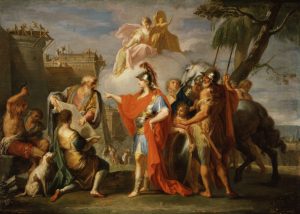Daniel and Zechariah
The prophets Daniel and Zechariah mentioned the name Alexander and prophesied the empire of the great Macedonian.
The prophecies in Daniel are considered accurate, and critics have suggested that the verses must have been written after the time of Alexander. However, historical and literary elements indicate that the writings were made in the 6th century B.C., while Alexander lived in the 4th century B.C.
Daniel mentioned numerous events that would happen centuries before his time, and those events have come true.
In Daniel 8:4, he spoke about Alexander:
I saw the ram pushing westward, and northward, and southward; so that no beasts might stand before him, neither was there any that could deliver out of his hand; but he did according to his will, and became great.
In Daniel 8:5, he spoke of Alexander as the horn:
And as I was considering, behold, a goat came from the west on the face of the whole earth and touched not the ground: and the goat had a notable horn between his eyes.
Then in Daniel 8:8, he prophesied Alexander’s sudden death at the peak of his military might:
Thus, the goat became very great, but at the height of his power, his large horn was broken off…”
Finally, in Daniel 8:22, Daniel foretold the coming of the four kingdoms after Alexander’s era:
“The four horns that replaced the broken one represent four kingdoms that will rise from that nation, but will not have the same power.”
The four kingdoms were spoken of again in Daniel 11:4:
“…his kingdom will be broken up and parceled out toward the four winds of heaven. It will not go to his descendants, nor will it have the authority with which he ruled, because his kingdom will be uprooted and given to others.”
In Zechariah, Alexander’s destruction of nations was described between 520 B.C. and 470 B.C., many, many years before the Macedonian’s conquests.
Zechariah tells of the destruction of Tyre:
“For Tyre built herself a fortress and piled up silver like dust, and gold like the mire of the streets. Behold, the Lord will dispossess her and cast her wealth into the sea; And she will be consumed with fire.”
Tyre was a city that was extremely worried about its riches. It even moved its location to strengthen its position from invaders. The city was a fortress in itself and was situated on a small island separated by half a kilometer of the sea from the mainland. The king of Assyria, Shalmaneser, tried to destroy Tyre, but he failed. Nebuchadnezzar too attempted and failed as well.
When Alexander arrived at Tyre, he already knew that the Assyrians had tried to conquer it for five years but failed, and also that the Babylonians had tried as well for 13 years, but failed. Alexander ordered his men to collect stone and other materials from Tyre’s original site and build a road that led to Tyre’s island city. Alexander had the city burned and its riches plundered.
The Book of the Maccabees
In 1 Maccabees 1:1-9, Alexander the Great’s conquests and downfall were discussed in length:
“This history begins when Alexander the Great, son of Philip of Macedonia, marched from Macedonia and attacked Darius, king of Persia and Media. Alexander enlarged the Greek Empire by defeating Darius and seizing his throne. He fought many battles, captured fortified cities, and put the kings of the region to death. As he advanced to the ends of the earth, he plundered many nations; and when he had conquered the world, he became proud and arrogant. By building up a strong army, he dominated whole nations and their rulers and forced everyone to pay him taxes.
When Alexander had been emperor for twelve years, he fell ill and realized that he was about to die. He called together his generals, noblemen who had been brought up with him since his early childhood, and he divided his empire, giving a part to each of them. 8 After his death, the generals took control, 9 and each had himself crowned king of his own territory. The descendants of these kings ruled for many generations and brought a great deal of misery on the world.”
